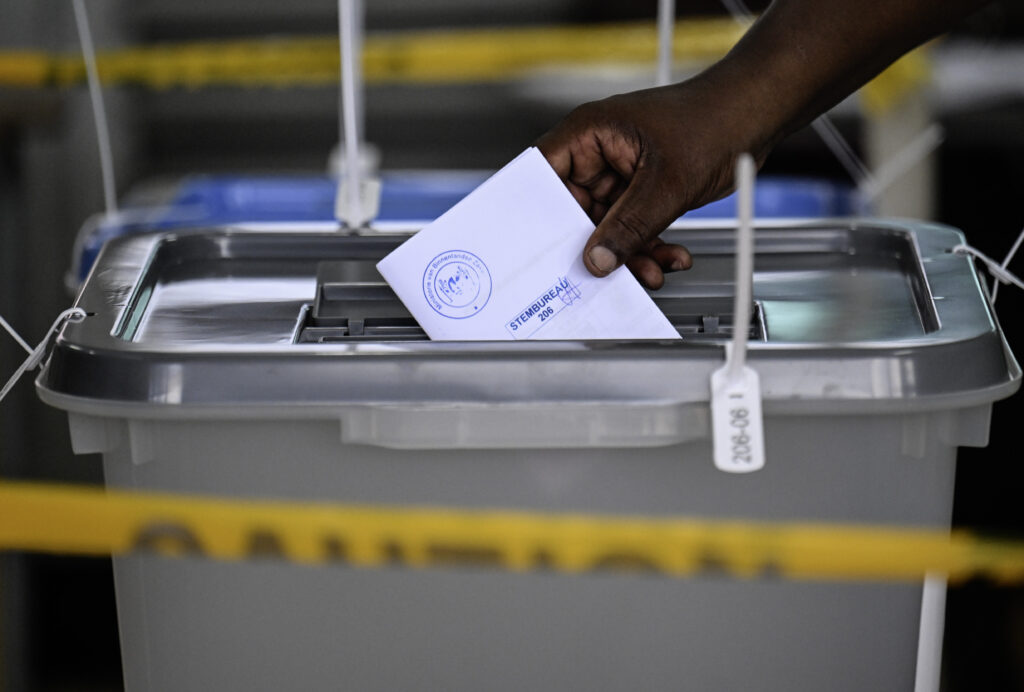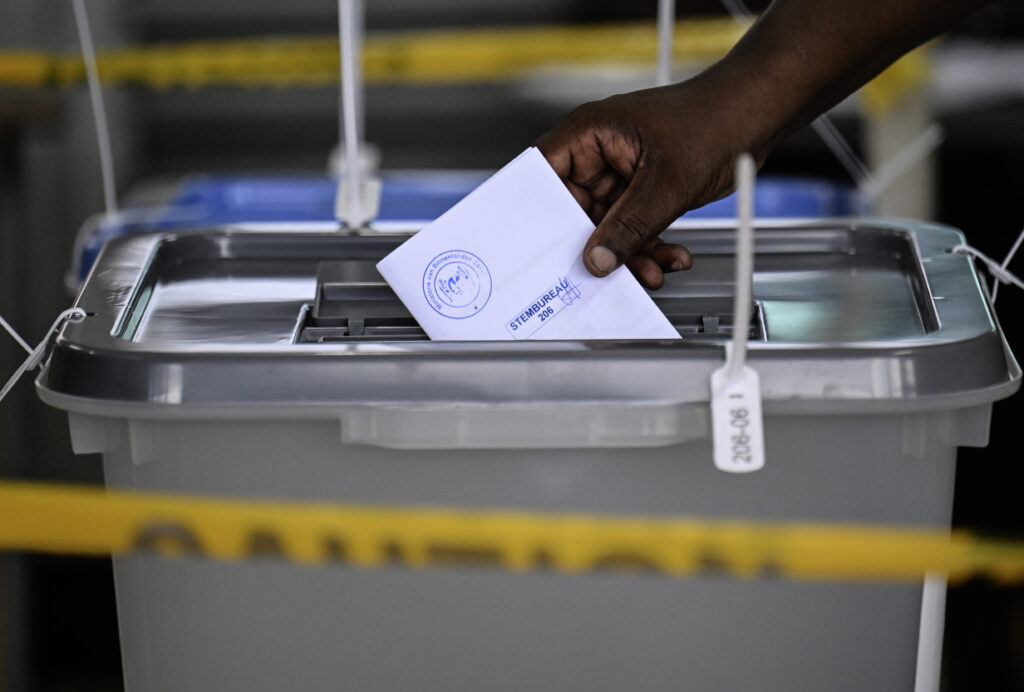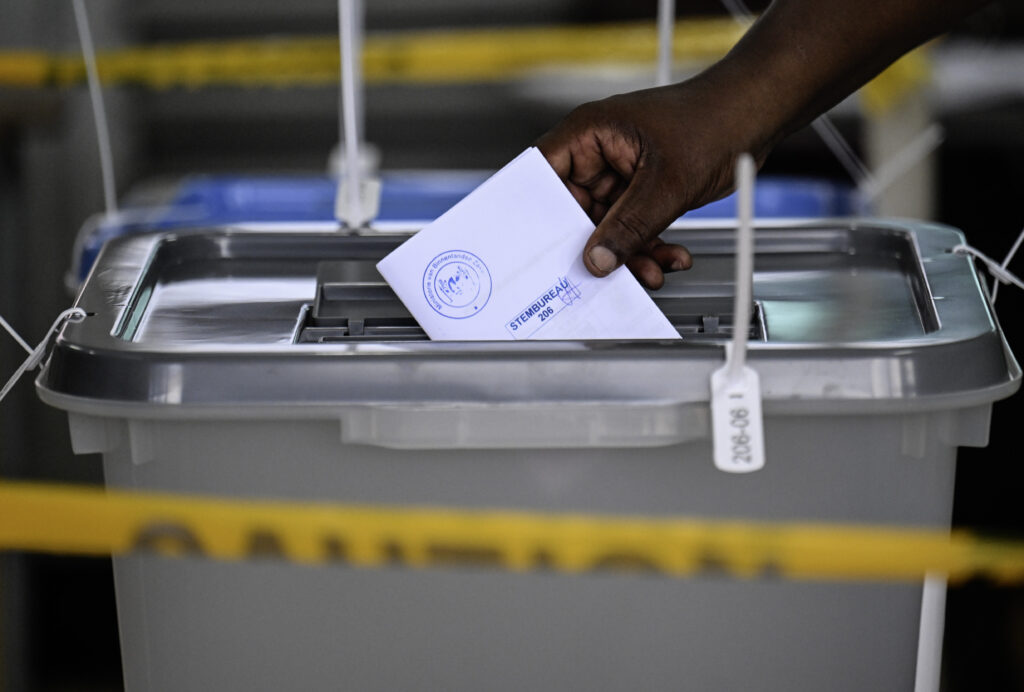Suriname: législatives pour décider qui gérera la future manne pétrolière
Le Suriname décide dimanche lors de législatives quel parti va diriger le plus petit pays d’Amérique du sud, voisin de la Guyane française, promis à des lendemains meilleurs grâce au pétrole.Les électeurs des 51 députés de la future assemblée, qui sera appelée à décider du tandem présidentiel, ont à choisir entre la continuité autour de l’actuel président Chan Santokhi, et le retour de la domination du parti de l’ex-président Desi Bouterse, récemment décédé.Cette ancienne colonie néerlandaise, minée depuis son indépendance en 1975 par des rébellions et coups d’Etat, dispose d’importantes réserves offshore découvertes récemment. Elles devraient offrir au pays, où 20% de la population vit sous le seuil de pauvreté, une importante manne financière à partir de 2028, quand débutera l’exploitation d’un bloc offshore à 220.000 barils par jour, beaucoup plus que les 5 à 6.000 actuels.”J’espère vraiment qu’on réussira à faire quelque chose avec tout ce pétrole”, confie à l’AFP Omar Tariq Kohinor, livreur de 30 ans, après avoir rempli son devoir électoral.”J’espère que ça va changer notre pays en bien, qu’on vive mieux, qu’on puisse avoir de meilleures routes, un peu plus de sécurité dans nos vies, une meilleure éducation pour nos enfants, de meilleures conditions pour les étudiants”, renchérit Rayshrie, 26 ans, employée de banque.- Coude-à-coude -Le président sortant Chan Santokhi, ancien policier puis ministre de la Justice, vise un deuxième mandat. Son arrivée au pouvoir en 2020 avait rassuré les marchés financiers et les institutions internationales, notamment le Fonds monétaire international qui avait accordé un prêt pour aider le pays à restructurer sa dette abyssale.Auteur de réformes économiques impopulaires pour sortir du surendettement, il promet, grâce à l’or noir, des investissements dans l’agriculture, le tourisme, la santé, l’éducation et les énergies vertes.M. Santokhi, polo orange (couleur de son parti) sous sa veste, a voté en compagnie de la Première dame en périphérie de Paramaribo et demandé à ses concitoyens de lui donner “le mandat pour terminer notre tâche”. “Beaucoup de choses ont été accomplies mais le travail n’est pas terminé”, a-t-il dit à l’AFP.Son opposante principale, présidente de l’Assemblée nationale, Jennifer Simons, a dit à l’AFP vouloir “être au pouvoir pour (s)’assurer que la population bénéficie réellement” des revenus attendus du pétrole en “établissant une loi selon laquelle toutes les entreprises devront travailler avec des Surinamais et acheter des produits du Suriname”.Le VHP du président Santokhi et le NDP de Mme Simons sont au coude-à-coude dans les intentions de vote. Ils ont affirmé qu’ils ne feront pas alliance.Avec un corps électoral de 399.937 inscrits, la marge d’erreur est grande, et l’incertitude sur le score tout autant.Sans majorité, ils devront devront nouer des alliances avec des petits partis qui monnayeront leur soutien contre une place dans le futur gouvernement.- 1 nom parmi 700 -Sur le NDP plane toujours l’ombre tutélaire de son leader Desi Bouterse, qui a dirigé le pays d’une main de fer après un coup d’Etat en 1980, puis démocratiquement entre 2010 et 2020. Sous son mandat, le Suriname était considéré comme un narco-Etat.Condamné aux Pays-Bas pour trafic de cocaïne et au Suriname pour le meurtre d’opposants en 1982 lorsqu’il était chef de la junte, M. Bouterse est décédé en décembre dans la clandestinité. Sa figure reste toutefois célébrée, notamment parmi la classe populaire où son franc-parler faisait merveille. Sa veuve a activement participé à la campagne électorale et est candidate à la députation. Dans chacun des 673 bureaux de vote, sur une double feuille A3 comportant plus de 700 candidats des 14 partis en lice, les électeurs devaient choisir un seul nom à cocher à l’encre rouge.Les bureaux de vote ferment à 19H00 (22H00 GMT). Des résultats provisoires sont attendus dans la nuit. Une fois qu’ils seront rendus officiels, d’ici trois semaines, la nouvelle Assemblée nationale aura un mois pour se réunir et élire à la majorité des deux tiers le président et le vice-président.
Suriname: législatives pour décider qui gérera la future manne pétrolière
Le Suriname décide dimanche lors de législatives quel parti va diriger le plus petit pays d’Amérique du sud, voisin de la Guyane française, promis à des lendemains meilleurs grâce au pétrole.Les électeurs des 51 députés de la future assemblée, qui sera appelée à décider du tandem présidentiel, ont à choisir entre la continuité autour de l’actuel président Chan Santokhi, et le retour de la domination du parti de l’ex-président Desi Bouterse, récemment décédé.Cette ancienne colonie néerlandaise, minée depuis son indépendance en 1975 par des rébellions et coups d’Etat, dispose d’importantes réserves offshore découvertes récemment. Elles devraient offrir au pays, où 20% de la population vit sous le seuil de pauvreté, une importante manne financière à partir de 2028, quand débutera l’exploitation d’un bloc offshore à 220.000 barils par jour, beaucoup plus que les 5 à 6.000 actuels.”J’espère vraiment qu’on réussira à faire quelque chose avec tout ce pétrole”, confie à l’AFP Omar Tariq Kohinor, livreur de 30 ans, après avoir rempli son devoir électoral.”J’espère que ça va changer notre pays en bien, qu’on vive mieux, qu’on puisse avoir de meilleures routes, un peu plus de sécurité dans nos vies, une meilleure éducation pour nos enfants, de meilleures conditions pour les étudiants”, renchérit Rayshrie, 26 ans, employée de banque.- Coude-à-coude -Le président sortant Chan Santokhi, ancien policier puis ministre de la Justice, vise un deuxième mandat. Son arrivée au pouvoir en 2020 avait rassuré les marchés financiers et les institutions internationales, notamment le Fonds monétaire international qui avait accordé un prêt pour aider le pays à restructurer sa dette abyssale.Auteur de réformes économiques impopulaires pour sortir du surendettement, il promet, grâce à l’or noir, des investissements dans l’agriculture, le tourisme, la santé, l’éducation et les énergies vertes.M. Santokhi, polo orange (couleur de son parti) sous sa veste, a voté en compagnie de la Première dame en périphérie de Paramaribo et demandé à ses concitoyens de lui donner “le mandat pour terminer notre tâche”. “Beaucoup de choses ont été accomplies mais le travail n’est pas terminé”, a-t-il dit à l’AFP.Son opposante principale, présidente de l’Assemblée nationale, Jennifer Simons, a dit à l’AFP vouloir “être au pouvoir pour (s)’assurer que la population bénéficie réellement” des revenus attendus du pétrole en “établissant une loi selon laquelle toutes les entreprises devront travailler avec des Surinamais et acheter des produits du Suriname”.Le VHP du président Santokhi et le NDP de Mme Simons sont au coude-à-coude dans les intentions de vote. Ils ont affirmé qu’ils ne feront pas alliance.Avec un corps électoral de 399.937 inscrits, la marge d’erreur est grande, et l’incertitude sur le score tout autant.Sans majorité, ils devront devront nouer des alliances avec des petits partis qui monnayeront leur soutien contre une place dans le futur gouvernement.- 1 nom parmi 700 -Sur le NDP plane toujours l’ombre tutélaire de son leader Desi Bouterse, qui a dirigé le pays d’une main de fer après un coup d’Etat en 1980, puis démocratiquement entre 2010 et 2020. Sous son mandat, le Suriname était considéré comme un narco-Etat.Condamné aux Pays-Bas pour trafic de cocaïne et au Suriname pour le meurtre d’opposants en 1982 lorsqu’il était chef de la junte, M. Bouterse est décédé en décembre dans la clandestinité. Sa figure reste toutefois célébrée, notamment parmi la classe populaire où son franc-parler faisait merveille. Sa veuve a activement participé à la campagne électorale et est candidate à la députation. Dans chacun des 673 bureaux de vote, sur une double feuille A3 comportant plus de 700 candidats des 14 partis en lice, les électeurs devaient choisir un seul nom à cocher à l’encre rouge.Les bureaux de vote ferment à 19H00 (22H00 GMT). Des résultats provisoires sont attendus dans la nuit. Une fois qu’ils seront rendus officiels, d’ici trois semaines, la nouvelle Assemblée nationale aura un mois pour se réunir et élire à la majorité des deux tiers le président et le vice-président.
Suriname: législatives pour décider qui gérera la future manne pétrolière
Le Suriname décide dimanche lors de législatives quel parti va diriger le plus petit pays d’Amérique du sud, voisin de la Guyane française, promis à des lendemains meilleurs grâce au pétrole.Les électeurs des 51 députés de la future assemblée, qui sera appelée à décider du tandem présidentiel, ont à choisir entre la continuité autour de l’actuel président Chan Santokhi, et le retour de la domination du parti de l’ex-président Desi Bouterse, récemment décédé.Cette ancienne colonie néerlandaise, minée depuis son indépendance en 1975 par des rébellions et coups d’Etat, dispose d’importantes réserves offshore découvertes récemment. Elles devraient offrir au pays, où 20% de la population vit sous le seuil de pauvreté, une importante manne financière à partir de 2028, quand débutera l’exploitation d’un bloc offshore à 220.000 barils par jour, beaucoup plus que les 5 à 6.000 actuels.”J’espère vraiment qu’on réussira à faire quelque chose avec tout ce pétrole”, confie à l’AFP Omar Tariq Kohinor, livreur de 30 ans, après avoir rempli son devoir électoral.”J’espère que ça va changer notre pays en bien, qu’on vive mieux, qu’on puisse avoir de meilleures routes, un peu plus de sécurité dans nos vies, une meilleure éducation pour nos enfants, de meilleures conditions pour les étudiants”, renchérit Rayshrie, 26 ans, employée de banque.- Coude-à-coude -Le président sortant Chan Santokhi, ancien policier puis ministre de la Justice, vise un deuxième mandat. Son arrivée au pouvoir en 2020 avait rassuré les marchés financiers et les institutions internationales, notamment le Fonds monétaire international qui avait accordé un prêt pour aider le pays à restructurer sa dette abyssale.Auteur de réformes économiques impopulaires pour sortir du surendettement, il promet, grâce à l’or noir, des investissements dans l’agriculture, le tourisme, la santé, l’éducation et les énergies vertes.M. Santokhi, polo orange (couleur de son parti) sous sa veste, a voté en compagnie de la Première dame en périphérie de Paramaribo et demandé à ses concitoyens de lui donner “le mandat pour terminer notre tâche”. “Beaucoup de choses ont été accomplies mais le travail n’est pas terminé”, a-t-il dit à l’AFP.Son opposante principale, présidente de l’Assemblée nationale, Jennifer Simons, a dit à l’AFP vouloir “être au pouvoir pour (s)’assurer que la population bénéficie réellement” des revenus attendus du pétrole en “établissant une loi selon laquelle toutes les entreprises devront travailler avec des Surinamais et acheter des produits du Suriname”.Le VHP du président Santokhi et le NDP de Mme Simons sont au coude-à-coude dans les intentions de vote. Ils ont affirmé qu’ils ne feront pas alliance.Avec un corps électoral de 399.937 inscrits, la marge d’erreur est grande, et l’incertitude sur le score tout autant.Sans majorité, ils devront devront nouer des alliances avec des petits partis qui monnayeront leur soutien contre une place dans le futur gouvernement.- 1 nom parmi 700 -Sur le NDP plane toujours l’ombre tutélaire de son leader Desi Bouterse, qui a dirigé le pays d’une main de fer après un coup d’Etat en 1980, puis démocratiquement entre 2010 et 2020. Sous son mandat, le Suriname était considéré comme un narco-Etat.Condamné aux Pays-Bas pour trafic de cocaïne et au Suriname pour le meurtre d’opposants en 1982 lorsqu’il était chef de la junte, M. Bouterse est décédé en décembre dans la clandestinité. Sa figure reste toutefois célébrée, notamment parmi la classe populaire où son franc-parler faisait merveille. Sa veuve a activement participé à la campagne électorale et est candidate à la députation. Dans chacun des 673 bureaux de vote, sur une double feuille A3 comportant plus de 700 candidats des 14 partis en lice, les électeurs devaient choisir un seul nom à cocher à l’encre rouge.Les bureaux de vote ferment à 19H00 (22H00 GMT). Des résultats provisoires sont attendus dans la nuit. Une fois qu’ils seront rendus officiels, d’ici trois semaines, la nouvelle Assemblée nationale aura un mois pour se réunir et élire à la majorité des deux tiers le président et le vice-président.
Hyderabad and last-place Chennai end IPL with big wins
South Africa’s Heinrich Klaasen struck his second IPL century on Sunday as he powered Sunrisers Hyderabad to a mammoth 278-3 and a 110-run win over Kolkata Knight Riders.In the first match of the day, Chennai Super Kings, already doomed to the wooden spoon, ended their IPL campaign on a high with an 83-run thrashing of Gujarat Titans in Ahmedabad.Chennai skipper M.S. Dhoni said he is in “no hurry” to decide on his future in the T20 tournament. The 43-year-old was reported to be retiring.Klaasen made the day his own with an unbeaten 105 off 39 balls to steer Hyderabad to IPL’s third highest total after they elected to bat at New Delhi’s Feroz Shah Kotla ground.Klaasen, who was promoted to number three, hit seven fours and nine sixes in a complete show of domination by Hyderabad after opener Travis Head hit a 40-ball 76.Three-time champions Kolkata, who won the IPL last year, were bowled out for 168 in 18.4 overs to end this edition eighth out in 10 teams.Hyderabad’s Australian import Head came out roaring with opening partner Abhishek Sharma in a blazing start of 92 in 6.4 overs.Abhishek fell for 32 before fellow left-hander Head put on 83 runs with Klaasen as it rained sixes at Feroz Shah Kotla ground.Klaasen reached his ton in 37 balls for the joint third-fastest IPL ton. West Indies’ Chris Gayle hit a hundred in 30 balls in 2013 and Rajasthan Royals’ teenager Vaibhav Suryavanshi in 35 balls this season.The left-handed Head fell to West indies spinner Sunil Narine, but Klaasen kept up the charge with Ishan Kishan.In the earlier match, Chennai hurt Gujarat’s chances of finishing in the top two. They made 230-5 powered by Devon Conway’s 52 and a 23-ball 57 by Dewald Brevis.The Chennai bowlers then combined to dismiss Gujarat, who have already qualified for the playoffs, for 147 in 18.3 overs.- Dhoni’s luxury of time -Chennai ended with four wins in 14 matches with debate raging once again over the future of veteran Dhoni, who took over as leader midway after injury to regular captain Ruturaj Gaikwad. Dhoni kept his cards close to his chest after the game.”I have four, five months to decide. There’s no hurry,” said Dhoni. The former India captain, who turns 44 in July, has had an underwhelming IPL season with the bat, scoring just 196 runs. However, he has again shone with his wicketkeeping, pulling off several fine stumpings.”Need to keep the body fit,” said Dhoni. “You have to be at your best. If cricketers start retiring for their performance, some of them will retire at 22. I will go back to Ranchi, enjoy a few bike rides.”I am not saying I am done, not saying I am coming back. I have the luxury of time.”Gujarat, Punjab Kings, Royal Challengers Bengaluru and Mumbai Indians are certain of filling the top four places, but are fighting to finish in the top two spots which offer two shots at reaching the final on June 3.Gujarat end the group stage with 18 points. Punjab (17), Bengaluru (17) and five-time winners Mumbai (16) have one match left.The spotlight was on Gujarat skipper Shubman Gill, who took the field a day after he was named captain of the Indian Test team.He was the first batter out, for 13 off nine balls, in a Gujarat chase that never took off.Gill said the defeat was a “hard pill to swallow”.
Disney’s ‘Lilo & Stitch’ crushes Memorial Day debut in N.America
Theaters across North America are enjoying an exceptional Memorial Day holiday weekend, with two new much-anticipated blockbusters bringing in an estimated box office totaling well over $250 million, analysts said Sunday.Disney’s family-friendly “Lilo & Stitch” earned an estimated $183 million, a record for the four-day Memorial Day weekend, according to Variety. The film has already taken in an additional $158 million internationally, industry tracker Exhibitor Relations reported. “This is a sensational opening,” placing the film among the top three Disney live-action remakes, said David A. Gross of Franchise Entertainment Research. Maia Kealoha (as Lilo), Hannah Waddingham, Courtney B. Vance and Zach Galifianakis star, while Chris Sanders again provides the voice of the chaos-creating blue alien Stitch. Paramount’s new spy thriller “Mission: Impossible — The Final Reckoning” — the latest, and ostensibly last, in the hugely successful Tom Cruise series — opened to an estimated $77 million in ticket sales in the United States and Canada.Gross called that an “excellent” opening, probably the best ever in the series. Ticket sales, however, need to make up for a huge production budget estimated at $400 million.In third, dropping two spots from its opening last weekend, was Warner Bros. and New Line’s horror film “Final Destination: Bloodlines,” at $24.5 million. Kaitlyn Santa Juana stars as a young woman who has to deal with the grisly aftereffects of her grandmother having long ago cheated Death.Fourth place went to Disney and Marvel’s superhero film “Thunderbolts,” at $11.6 million. Florence Pugh and Sebastian Stan lead a motley bunch of misfits and antiheroes. The film has taken in more than $350 million worldwide.And in fifth was Ryan Coogler’s vampire thriller “Sinners,” raking in $11.2 million. The film has now earned $259 million domestically to become one of the highest-grossing R-rated films ever, according to Variety.Rounding out the top films were:”The Last Rodeo” ($6.3 million)”Friendship” ($5.7 million)”A Minecraft Movie” ($2.9 million)”The Accountant 2″ ($2.5 million)
Angleterre: Aston Villa en grand perdant de l’Europe
Aston Villa a laissé filer la Ligue des champions lors d’une dernière journée cauchemardesque en Premier League, dimanche, laissant Manchester City, Chelsea et Newcastle filer vers la grande Europe.L’équipe d’Unai Emery s’est inclinée 2-0 chez Manchester United, à dix, avec une polémique arbitrale à la clé, et termine en dehors du top 5 qualificatif à cause d’une différence de buts inférieure à Newcastle.Le malheur des Villans fait donc le bonheur des Magpies, battus 1-0 chez eux par Everton, mais de retour en C1 après un an d’absence.Manchester City, quadruple champion sortant, n’a lui pas tremblé chez Fulham (2-0) et consolidé sa place sur le podium, un moindre mal au bout d’une saison poussive en Premier League.Ilkay Gündogan a été l’artisan du succès avec un but acrobatique (21e, 1-0) et un pénalty obtenu, transformé ensuite avec sang froid par Erling Haaland (72e, 2-0).Les Citizens de Pep Guardiola, septièmes fin décembre, ont terminé la saison en boulet de canon avec dix matches sans défaite (3 nuls, 7 victoires).Le ticket pour la C1, “c’est comme un titre, (à cause) des obstacles” rencontrés cette saison, a réagi l’entraîneur, en référence aux blessures ayant touché son effectif.- Trophée et 29e but pour Salah -La deuxième place est elle restée aux mains d’Arsenal, vainqueur sur le tard à Southampton (2-1) grâce à un but du capitaine Martin Odegaard.Les Gunners finissent avec l’étiquette de dauphins pour la troisième saison d’affilée, cette fois avec dix points de moins que le champion.Liverpool, sacré depuis fin avril, a terminé l’année sur un match nul 1-1 à domicile contre Crystal Palace, avec l’aide de Mohamed Salah, auteur de son 29e et dernier but de la saison.Le meilleur buteur et meilleur passeur de la Premier League 2024-2025 a évité à Liverpool une fausse note avant la remise du trophée, devant un stade d’Anfield tout de rouge vêtu, et bouillant du début à la fin.Les autres “Reds” du championnat, ceux de Nottingham Forest, n’avaient eux pas la tête à la fête après leur défaite contre Chelsea (1-0).Ils ont passé une bonne partie de l’année parmi les cinq premiers, une performance remarquable après avoir terminé la saison précédente juste au-dessus des relégués. Mais leur élan s’est brisé dans la dernière ligne droite, avec seulement deux victoires dans les huit derniers matches.L’équipe de Nuno Espirito Santo, septième au final, disputera la Ligue Conference la saison prochaine.- “Difficile à avaler” pour Villa -De son côté, Aston Villa devra se contenter de la Ligue Europa après cette fin de championnat rageante.Dixièmes fin février, les Villans d’Unai Emery ont amassé huit victoires en dix matches pour remonter vers les places européennes, sans parvenir à arracher le Graal de la Ligue des champions.Dimanche, ils ont vécu un enfer à Old Trafford avec un carton rouge reçu en première période (Emiliano Martinez), deux buts encaissés en seconde, et un but marqué mais invalidé dans des conditions litigieuses.L’arbitre a sifflé, à tort, une faute de Morgan Rogers sur Altay Bayindir avant que l’attaquant ne marque, la VAR a revu les images mais le corps arbitral n’a pas pu revenir sur la décision en raison du règlement.”Il (l’arbitre) ne savait pas vraiment quoi dire”, a dit le capitaine d’Aston Villa, John McGinn, sur TNT Sports. “C’est très difficile à avaler, surtout quand l’impact sur nous, en tant que club et équipe, est si important”.Le milieu écossais a toutefois reconnu que la victoire était méritée pour Manchester United.Les Red Devils ont sauvé l’honneur en terminant à la quinzième place, quatre jours après leur défaite en finale de Ligue Europa contre Tottenham. Les Spurs ont eux sombré 4-1 contre Brighton, à domicile, et ils finissent la saison à la 17e place, la première au-dessus de la zone de relégation.






